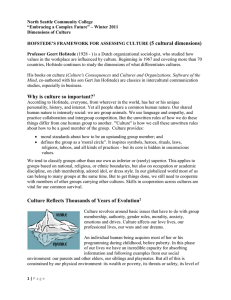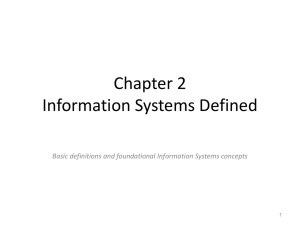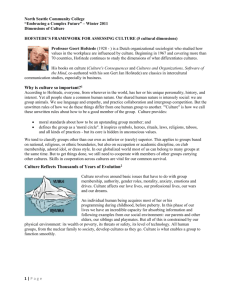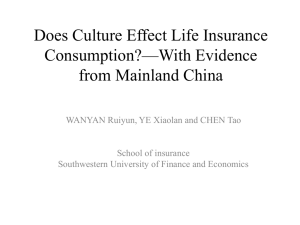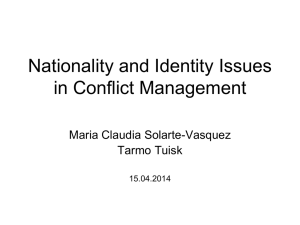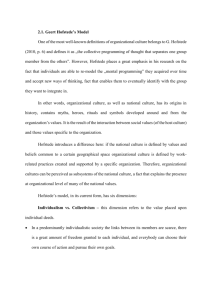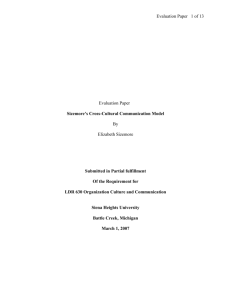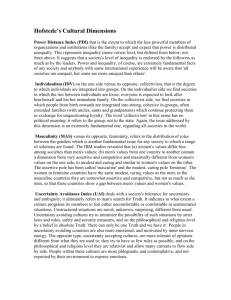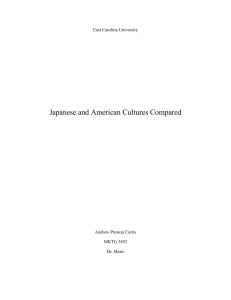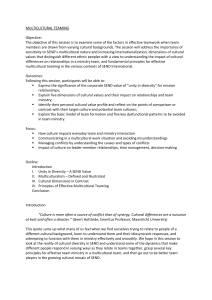Geert Hofstede work on cultural differences - Salto
advertisement
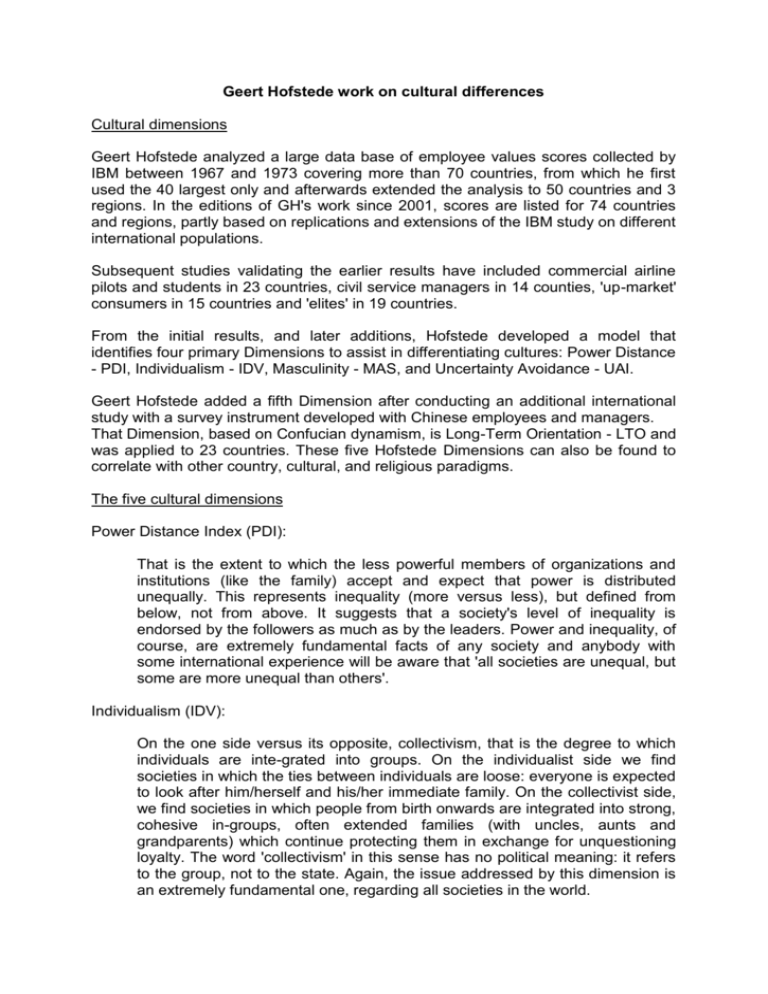
Geert Hofstede work on cultural differences Cultural dimensions Geert Hofstede analyzed a large data base of employee values scores collected by IBM between 1967 and 1973 covering more than 70 countries, from which he first used the 40 largest only and afterwards extended the analysis to 50 countries and 3 regions. In the editions of GH's work since 2001, scores are listed for 74 countries and regions, partly based on replications and extensions of the IBM study on different international populations. Subsequent studies validating the earlier results have included commercial airline pilots and students in 23 countries, civil service managers in 14 counties, 'up-market' consumers in 15 countries and 'elites' in 19 countries. From the initial results, and later additions, Hofstede developed a model that identifies four primary Dimensions to assist in differentiating cultures: Power Distance - PDI, Individualism - IDV, Masculinity - MAS, and Uncertainty Avoidance - UAI. Geert Hofstede added a fifth Dimension after conducting an additional international study with a survey instrument developed with Chinese employees and managers. That Dimension, based on Confucian dynamism, is Long-Term Orientation - LTO and was applied to 23 countries. These five Hofstede Dimensions can also be found to correlate with other country, cultural, and religious paradigms. The five cultural dimensions Power Distance Index (PDI): That is the extent to which the less powerful members of organizations and institutions (like the family) accept and expect that power is distributed unequally. This represents inequality (more versus less), but defined from below, not from above. It suggests that a society's level of inequality is endorsed by the followers as much as by the leaders. Power and inequality, of course, are extremely fundamental facts of any society and anybody with some international experience will be aware that 'all societies are unequal, but some are more unequal than others'. Individualism (IDV): On the one side versus its opposite, collectivism, that is the degree to which individuals are inte-grated into groups. On the individualist side we find societies in which the ties between individuals are loose: everyone is expected to look after him/herself and his/her immediate family. On the collectivist side, we find societies in which people from birth onwards are integrated into strong, cohesive in-groups, often extended families (with uncles, aunts and grandparents) which continue protecting them in exchange for unquestioning loyalty. The word 'collectivism' in this sense has no political meaning: it refers to the group, not to the state. Again, the issue addressed by this dimension is an extremely fundamental one, regarding all societies in the world. Masculinity (MAS) versus its opposite, femininity refers to the distribution of roles between the genders which is another fundamental issue for any society to which a range of solutions are found. The IBM studies revealed that (a) women's values differ less among societies than men's values; (b) men's values from one country to another contain a dimension from very assertive and competitive and maximally different from women's values on the one side, to modest and caring and similar to women's values on the other. The assertive pole has been called 'masculine' and the modest, caring pole 'feminine'. The women in feminine countries have the same modest, caring values as the men; in the masculine countries they are somewhat assertive and competitive, but not as much as the men, so that these countries show a gap between men's values and women's values. Uncertainty Avoidance Index (UAI) Deals with a society's tolerance for uncertainty and ambiguity; it ultimately refers to man's search for Truth. It indicates to what extent a culture programs its members to feel either uncomfortable or comfortable in unstructured situations. Unstructured situations are novel, unknown, surprising and different from usual. Uncertainty avoiding cultures try to minimize the possibility of such situations by strict laws and rules, safety and security measures, and on the philosophical and religious level by a belief in absolute Truth; “there can only be one Truth and we have it”. People in uncertainty avoiding countries are also more emotional, and motivated by inner nervous energy. The opposite type, uncertainty accepting cultures, are more tolerant of opinions different from what they are used to; they try to have as few rules as possible, and on the philosophical and religious level they are relativist and allow many currents to flow side by side. People within these cultures are more phlegmatic and contemplative, and not expected by their environment to express emotions. Long-Term Orientation (LTO) Versus short-term orientation: this fifth dimension was found in a study among students in 23 countries around the world, using a questionnaire designed by Chinese scholars It can be said to deal with Virtue regardless of Truth. Values associated with Long Term Orientation are thrift and perseverance; values associated with Short Term Orientation are respect for tradition, fulfilling social obligations, and protecting one's 'face'. Both the positively and the negatively rated values of this dimension are found in the teachings of Confucius, the most influential Chinese philosopher who lived around 500 B.C.; however, the dimension also applies to countries without a Confucian heritage. PDI Power Distance Index IDV Individualism MAS UAI LTO Masculinity Uncertainty Avoidance Index Long-Term Orientation PDI IDV MAS UAI LTO Arab World ** 80 38 52 68 Argentina 49 46 56 86 Australia 36 90 61 51 Austria 11 55 79 70 Belgium 65 75 54 94 Brazil 69 38 49 76 Bulgaria * 70 30 40 85 China * 80 20 66 30 Colombia 67 13 64 80 Czech Republic * 57 58 57 74 Denmark 18 74 16 23 Estonia * 40 60 30 60 Finland 33 63 26 59 France 68 71 43 86 Germany 35 67 66 65 Greece 60 35 57 112 Hungary * 46 80 88 82 50 India 77 48 56 40 61 Ireland 28 70 68 35 Israel 13 54 47 81 Italy 50 76 70 75 Japan 54 46 95 92 Morocco * 70 46 53 68 Netherlands 38 80 14 53 44 Norway 31 69 8 50 20 Poland * 68 60 64 93 32 Romania * 90 30 42 90 Russia * 93 39 36 95 Slovakia * 104 52 110 51 South Africa 49 65 63 49 Country 31 65 118 13 31 80 38 Spain 57 51 42 86 Sweden 31 71 5 29 Switzerland 34 68 70 58 Turkey 66 37 45 85 United Kingdom 35 89 66 35 25 United States 40 91 62 46 29 West Africa 77 20 46 54 16 33 * Estimated values ** Regional estimated values: ‘Arab = Egypt, Iraq, Kuwait, Lebanon, Libya, World’ Saudi Arabia, United Arab Emirates ‘East = Ethiopia, Kenya, Tanzania, Zambia Africa’ ‘West = Ghana, Nigeria, Sierra Leone Africa’ Cultural questionnaire Section 1 Where do you feel more comfortable? Children should be taught that their opinion is as important as their parents´ Children should be taught to not take things for granted, in the family or other institutions In a company/organization, people must be able to create their own place/function People must not take the boss decisions for granted. Always question the actions of the boss. The most effective way to change a political system is through public debates and free elections TOTAL Section 2 12345 Children should be taught to never question their parents´ authority 12345 Children should be taught to accept the authority of older or important people 12345 All people in an organization or company have clearly defined roles 12345 The boss takes all decisions, everybody in a organization/company accept and respect him The most effective way to change a political system is to replace those in power through drastic means 12345 Where do you feel more comfortable? People have strong loyalty to the group(s) they belong to The conventions/rules of the group I belong to influence my behaviour I am concerned with what the others 1 2 3 4 5 People choose their friends based on common likes/dislikes/interests 1 2 3 4 5 I have full personal freedom 1 2 3 4 5 I am concerned only with my own rules think about me People are promoted/recognized 12345 based on their loyalty and age It is immoral for a boss not to offer a 1 2 3 4 5 job to a relative TOTAL Section 3 Where do you feel more comfortable? I have sympathy for those who do not win and I envy others for their success At work, I am motivated by a relaxed, friendly atmosphere Decisions at work must be based on consensus A good quality of life is important for both men and women I seek love and mutual affection in a partner TOTAL Section 4 and objectives People are promoted based on competence, no matter their age It is immoral for a boss to offer a job to a relative 1 2 3 4 5 I admire winners and think those who lose must be punished 1 2 3 4 5 At work, I need to have clear objectives and an evaluation system for what I accomplish 1 2 3 4 5 Conflict is positive and productive 1 2 3 4 5 Men should be focused on material success and women must be concerned with the well-being of the others 1 2 3 4 5 What I want most from my partner is support in difficult situations Where do you feel more comfortable? Children must be taught to cope with chaos and ambiguity People who can move in different environments are appreciated in society People should always have to carry an ID It is improper to express feelings in public Society has very few rules 1 2 3 4 5 Children must be taught to be organized and avoid ambiguity 1 2 3 4 5 High competence and expert leadership are appreciated in society 1 2 3 4 5 People should always have an ID 1 2 3 4 5 It is ok to show feelings in public, at the right place and time 1 2 3 4 5 There are some rules and customs that all people must respect TOTAL Section 5 Where do you feel more comfortable? People know very clearly what is Good and what is Bad People value personal stability and continuity 1 2 3 4 5 People embark on common goals without being so concerned with what is Good and what is Bad 1 2 3 4 5 People think everything is relative and permanently changing Children must be taught to ask WHY People´s behaviour is always influenced by their roots People want coherence in the information they are presented TOTAL 1 2 3 4 5 Children must be taught to ask WHAT and HOW 1 2 3 4 5 People project their actions into the future 1 2 3 4 5 People can live with contradictory information
